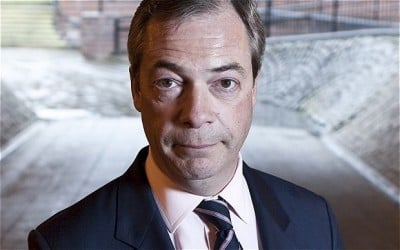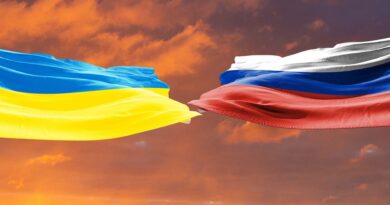“We Have Provoked This War” according to U.K. Reform Leader Nigel Farage. Tensions in Pre-election Political Climate

Speaking to BBC’s “Panorama” on Friday evening, Reform UK leader Nigel Farage claimed the West provoked Russia into going into a full-scale military campaign against the Ukrainian government. This has triggered very strong-worded responses and has increased tensions in the British pre-election political climate. In Europe as well there is now a lot of alarmism about the rise of the “far-right” and supposed “Kremlin agents”.
In early 2022, Farage posted a comment on social media claiming the then-recent military campaign in Ukraine was “a consequence of EU and NATO expansion.” During the aforementioned Friday interview, the politician was asked whether he still held such views today, to which he replied that he had been warning about the risks of such an expansion for “decades”. He made the caveat that, “of course, it’s his [Putin’s] fault”, and added that “he’s used what we’ve done as an excuse.” Farage also said: “we have provoked this war.” The Eurosceptic politician and broadcaster claimed he dislikes Russian President Vladimir Putin personally, but admires him “as a political operator” only.
In addition, Farage summarized his view on the ongoing Russian-Ukrainian conflict:
“I stood up in the European parliament in 2014 and I said: ‘There will be a war in Ukraine.’ Why did I say that? It was obvious to me that the ever-eastward expansion of NATO and the European Union was giving this man [Putin] a reason … to say: ‘They’re coming for us again,’ and to go to war.”
So, basically he said NATO played into the Russian President’s hands by providing him with a justification to carry out a military campaign in Ukraine. Such remarks (albeit critical of eastward NATO’s expansion) can hardly be described as “pro-Putin” or anything like that. The British politician in fact accused Putin of having used such an expansion as an “excuse”.
Even so, this prompted Rishi Sunak, the Prime Minister of the United Kingdom, in turn to accuse Farage of letting himself be used:
“What he said is completely wrong and only plays into [Putin’s] hands.” Sunak also stated that: “This kind of appeasement is dangerous for Britain’s security, the security of our allies that rely on us and only emboldens Putin further.”
From Labour leader Keir Starmer to Sunak, a whole procession of British leaders took turns describing Farage’s remarks as “disgraceful”, “Russian propaganda”, and so on. Farage is no fringe actor: he was a key figure in the 2016 Brexit campaign and should thus be taken seriously.
The Prime Minister, in condemnation of Farage’s words, added that Putin was behind the deployment of “nerve agent on the streets of Britain”, which is a pretty wild (and rather uncorroborated) claim in itself. Prime Minister Sunak was in all likelihood referring to the 2018 alleged attempted murder of Sergei Skripal in Salisbury, England, supposedly by means of the nerve agent known as Novichok.
Sergei Skripal in turn is a former Russian military intelligence officer who acted as a double agent for London in the nineties and early 2000s and who resides in England. He was sentenced in Russia for high treason consisting in selling secret and sensitive information for British intelligence. Upon the alleged attack, the UK was quick to accuse Moscow of being behind it.
What happened in 2018 is far from being clear, though: Novichok is a powerful lethal agent. It can be up to eight times more poisonous than the famous “venomous agent X” (VX). And yet, after having been found lying unconscious on a shopping center bench alongside his daughter Yulia Skipral, both of them survived the supposed poisoning.
But with all things pertaining to Russia, there seems to be a widely accepted protocol: in a few words, any Western accusation against Moscow (no matter how incredible) must always be deemed completely reliable and never doubted (or else “conspiracy theory!”), whereas any Russian complaint, criticism or accusation against Washington or European powers must be automatically disregarded as mere Russian propaganda – even when proved true. This is why the New York Times, in 2023, reported, in an inadvertently comical way, that “[Ukrainian]troops’ use of patches bearing Nazi emblems risks fueling Russian propaganda and spreading imagery that the West has spent a half-century trying to eliminate.”
Thus, inconvenient facts such as the significant presence of neo-Nazism amongst the ranks of Ukrainian military personnel especially within the Azov regiment), or, say, minority rights in Ukraine or NATO’s aggressive expansion, must be whitewashed or minimized or else “Russian propaganda!”. Those are all real enough issues – notwithstanding any valid criticism one may have regarding the Russian actions and its military campaign. And it’s about time to acknowledge the reality of all those issues. For a while, talking about that, in the Western establishment, was a monopoly of radicals. This could be changing.
Despite all the vocal condemnations against him, Farage is not a lone voice – neither in Britain nor in the continent. With anti-immigrant riots spreading in Dublin, and a catastrophic housing crisis in Europe, those extra billions to Ukraine in military aid (not to mention the employment of troops) is becoming increasingly hard to sell to the public.
Is it now finally becoming acceptable to take into consideration the West’s share of responsibility for the ongoing crisis in Eastern Europe (and in the Middle East for that matter)? And to have a frank public discussion on it, for that matter? One can only hope so.
*
Note to readers: Please click the share button above. Follow us on Instagram and Twitter and subscribe to our Telegram Channel. Feel free to repost and share widely Global Research articles.
This article was originally published on InfoBrics.
Uriel Araujo is a researcher with a focus on international and ethnic conflicts. He is a regular contributor to Global Research.


